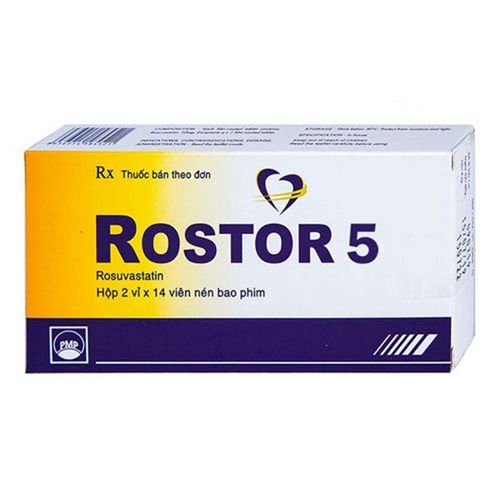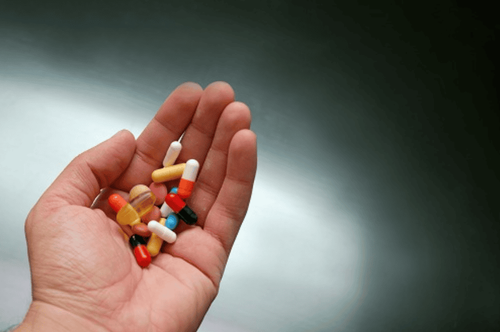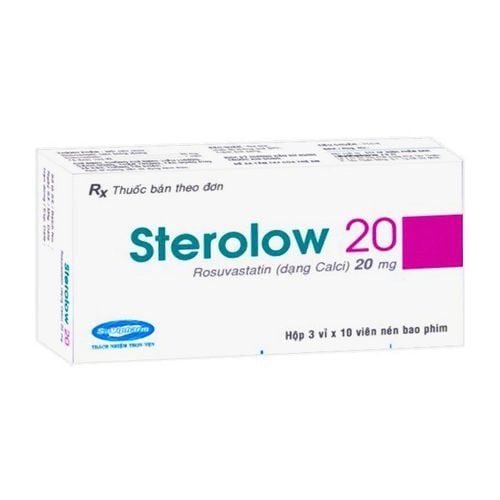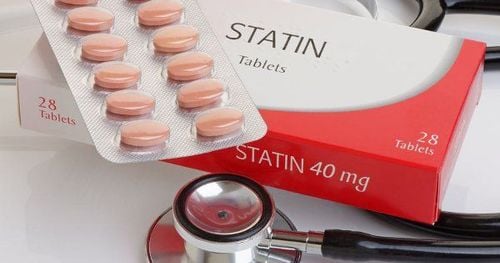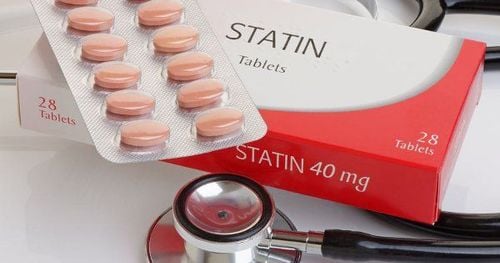This is an automatically translated article.
Alvostat is a lipid-lowering statin drug. Used to reduce a number of blood fat indicators when the application of dietary or exercise measures does not have the desired effect.
1. What is Alvostat?
What is Alvostat? The main ingredient of Alvostat is Rosuvastatin 10mg and excipients are enough for one film-coated tablet.
Rosuvastatin helps limit the conversion of 3-Hydroxy -3-Methylglutaryl coenzyme A to Mevalonate, which is a selective and competitive inhibitor of HMG-CoA reductase. Mevalonate can be converted to cholesterol. Thus, it has the effect of limiting the free cholesterol that is harmful to the body. The liver is where Rosuvastatin has the most effect, this is also the organ that determines the production of cholesterol.
2. Indications and contraindications of Alvostat
Indications:
Alvostat is indicated for use in the following cases:
Support for the treatment of hyperlipidemia, indicated for the treatment of hypercholesterolemia (type IIa including heterozygous hereditary hypercholesterolemia). Homozygous hereditary hypercholesterolemia. Contraindications
Subjects are hypersensitive to any ingredient of the drug. Pregnant or lactating women Subjects with developing liver disease. Subjects with musculoskeletal disorders. Severe kidney failure. Galactose intolerance, Lapp-Lactase deficiency or Glucose-Galactose malabsorption should not use the drug because the excipients contain lactose.
3. Dosage and how to take Alvostat
3.1 Dosage of Alvostat Drugs Adults:
Start with a dose of 5-10 mg x 1 time / day, increase the dose every 4 weeks if necessary, up to a maximum of 20 mg x 1 time / day. Severely dangerous high blood cholesterol: 40 mg x 1 time / day. Elderly patients, Asian patients, patients at risk for myopathy: 5 mg should be started. Marked hypercholesterolemia, such as patients with homozygous familial hypercholesterolemia: 20 mg once daily. Renal impairment (creatinine clearance 30-60mL/min): 5 mg once daily, maximum 20 mg once daily. Children:
Heterozygous familial hypercholesterolemia:
The usual starting dose is 5 mg once daily. Children 6-9 years: The maximum recommended dose is 10 mg/day. The safety and effectiveness of doses greater than 10 mg have not been studied in this age group. Children 10 - 17 years old, the usual dose can be used is 5 - 20 mg x 1 time / day. The safety and effectiveness of doses greater than 20 mg have not been studied. Homozygous familial hypercholesterolemia:
Children aged 6 - 17 years: The starting dose can be used from 5 - 10 mg x 1 time / day. The maximum recommended dose is 20 mg administered once a day. Children under 6 years: The use of rosuvastatin in children under 6 years of age is not recommended because the safety and effectiveness of its use in this population have not been studied.
3.2 How to take Alvostat Alvostat drug is taken with water, the patient does not chew or crush the tablet before taking it. Accordingly, it should be taken at the same time of day to increase the effectiveness of the drug. During the course of taking the drug, you still need to maintain a diet to achieve good treatment effects and regularly exercise to improve efficiency.
4. Alvostat side effects
When taking the drug, you should be aware that you may encounter side effects including:
Common: Diarrhea, constipation, flatulence, abdominal pain, nausea, headache, blurred vision, dizziness, insomnia, weakness, muscle aches, joint pain, can cause elevated liver enzymes. Uncommon: Myopathy may be associated with muscle weakness and increased plasma creatine phosphokinase (CPK) levels, skin rash, rhinosinusitis, pharyngitis, cough. Rare: memory loss, confusion; myositis, rhabdomyolysis, which can lead to acute renal failure secondary to myoglobinuria, increased HbA1c and increased fasting serum glucose levels. Other side effects: Depression, peripheral neuropathy, sleep disturbance, Stevens-Johnson syndrome, Immune-mediated necrotizing myopathy, edema. When experiencing side effects of the drug, it is necessary to notify the doctor for advice or treatment if necessary.
5. Things to pay attention to when taking Alvostat
Before taking the drug, the patient should inform the doctor about the history of drug allergies, acquired diseases. Use caution when using the drug for the following subjects: Patients with kidney disease, hypothyroidism, personal or family history of hereditary muscle disorders, history of myotoxicity due to previous use of Statins / Fibrates, history of liver disease, heavy drinking, patients over 70 years old, people with risk factors for rhabdomyolysis. Because the drug affects the liver, liver function tests should be performed before starting treatment and when symptoms suggestive of liver damage (unusual fatigue or weakness, loss of appetite, pain) are present. abdomen, dark urine, pale stools, yellowing of the skin or eyes). The drug should be discontinued if there is severe liver damage with clinical manifestations possibly accompanied by hyperbilirubinemia or jaundice. The drug should be used with caution in patients who drink heavily or have a history of liver disease, because of the increased risk of hepatotoxicity. Effects on skeletal muscle such as myalgia, myopathy and, rarely, rhabdomyolysis have been reported in patients treated with rosuvastatin at all doses and in particular with doses above 20 mg. Discontinue if creatine kinase (CK) levels increase significantly or if myopathy is diagnosed or suspected. Reduce drug dose when taking 40mg/day in patients with unexplained persistent proteinuria. Interstitial lung disease: Cases of interstitial lung disease have been reported with some statin drugs, especially during long-term treatment. Manifestations include dyspnea, cough without sputum, and general deterioration (fatigue, weight loss, and fever). If it is suspected that the patient has developed interstitial lung disease, statin therapy should be discontinued. Since statins reduce cholesterol synthesis and may also decrease synthesis of many other biologically active cholesterol-derived substances, they may cause fetal harm if administered to a pregnant woman. Do not use for pregnant women and make sure to use effective contraception while taking the drug. If you find out you are pregnant, you need to stop taking the medicine and tell your doctor.
6. Drug interactions
Possible drug interactions are as follows:
Do not take the drug while taking Cyclosporin, ezetimibe, because this will increase the toxicity of alvostat Do not take with Antacid, Erythromycin, because it may reduce the effect of the drug. , reduced immunity. The risk of myopathy, including rhabdomyolysis, may be increased when systemic fusidic acid is co-administered with statins. Storage: The drug storage condition is at a temperature of 25 degrees Celsius, avoid moisture and keep the medicine out of the reach of children.
Hopefully, with the above information, you know what Alvostat is and how it works. The drug is used under a doctor's prescription, so patients should consult their doctor carefully before taking it to avoid unwanted side effects.
Follow Vinmec International General Hospital website to get more health, nutrition and beauty information to protect the health of yourself and your loved ones in your family.
Please dial HOTLINE for more information or register for an appointment HERE. Download MyVinmec app to make appointments faster and to manage your bookings easily.




